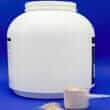Background
- Whey protein is one of the two major groups of proteins found in milk. It is a highly digestible source of protein.
- Whey proteins are used in a variety of foods, including ice cream, bread, and infant formula. Whey protein has been used in fat replacers for low-fat ice cream and as an ingredient in milk replacement products. Whey protein is also a popular dietary supplement for improving muscle strength and body composition and for the prevention of heart disease, diabetes, and age-related bone loss.
- Whey protein may aid in the prevention of some hereditary conditions, such as the tendency to develop allergies. It may act as an appetite suppressant and aid in the control of blood sugar.
References
- Alexander DD, Cabana MD. Partially hydrolyzed 100% whey protein infant formula and reduced risk of atopic dermatitis: a meta-analysis. J Pediatr Gastroenterol Nutr 2010;50(4):422-30.
View Abstract - Alexander DD, Schmitt DF, Tran NL, et al. Partially hydrolyzed 100% whey protein infant formula and atopic dermatitis risk reduction: a systematic review of the literature. Nutr Rev 2010;68(4):232-45.
View Abstract - Akhavan T, Luhovyy BL, Brown PH, et al. Effect of premeal consumption of whey protein and its hydrolysate on food intake and postmeal glycemia and insulin responses in young adults. Am J Clin Nutr 2010;91(4):966-75.
View Abstract - Burke DG, Chilibeck PD, Davidson KS, et al. The effect of whey protein supplementation with and without creatine monohydrate combined with resistance training on lean tissue mass and muscle strength. Int J Sport Nutr Exerc Metab 2001;11(3):349-64.
View Abstract - Chauhan JM, Lim SY, Powers JR, et al. Short communication: low-fat ice cream flavor not modified by high hydrostatic pressure treatment of whey protein concentrate. J Dairy Sci 2010;93(4):1452-8.
View Abstract - Evans J, Zulewska J, Newbold M, et al. Comparison of composition and sensory properties of 80% whey protein and milk serum protein concentrates. J Dairy Sci 2010;93(5):1824-43.
View Abstract - Haff GG. Whey Protein Supplementation Increases Fat loss and Spares Lean Muscle in Obese Subjects. NSCA's Performance Training Journal. Sep 2008;7(5):9.
- Haraguchi FK, Silva ME, Neves LX, et al. Whey protein precludes lipid and protein oxidation and improves body weight gain in resistance-exercised rats. Eur J Nutr 2010 Nov 3. [Epub ahead of print]
View Abstract - Leksrisompong PP, Miracle RE, Drake M. Characterization of flavor of whey protein hydrolysates. J Agric Food Chem 2010;58(10):6318-27.
View Abstract - Leng XJ, Chai Z, Ren FZ, et al. Study of microstructure of pectin and whey protein isolate mixtures under incompatible conditions using dynamic light scattering and transmission electron microscopy]. Guang Pu Xue Yu Guang Pu Fen Xi 2010;30(8):2196-200.
View Abstract - Ou K, Liu Y, Zhang L, et al. Effect of neutrase, alcalase, and papain hydrolysis of whey protein concentrates on iron uptake by Caco-2 cells. J Agric Food Chem 2010;58(8):4894-900.
View Abstract - Pal S, Ellis V, Dhaliwal S. Effects of whey protein isolate on body composition, lipids, insulin and glucose in overweight and obese individuals. Br J Nutr 2010;104(5):716-23.
View Abstract - Prommakool A, Sajjaanantakul T, Janjarasskul T, et al. Whey protein-okra polysaccharide fraction blend edible films: tensile properties, water vapor permeability and oxygen permeability. J Sci Food Agric 2010 Oct 19. [Epub ahead of print].
View Abstract - Walker TB, Smith J, Herrera M, et al. The influence of 8 weeks of whey-protein and leucine supplementation on physical and cognitive performance. Int J Sport Nutr Exerc Metab 2010;20(5):409-17.
View Abstract - Zemel MB, Zhao F. Role of whey protein and whey components in weight management and energy metabolism]. Wei Sheng Yan Jiu 2009;38(1):114-7.
View Abstract







